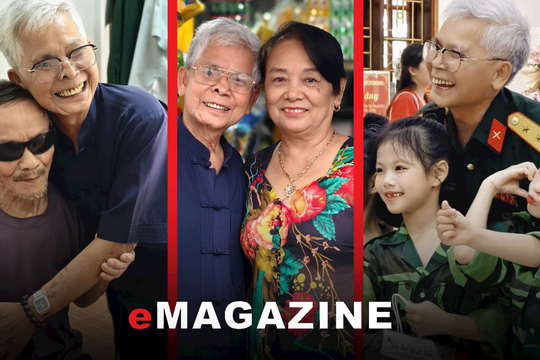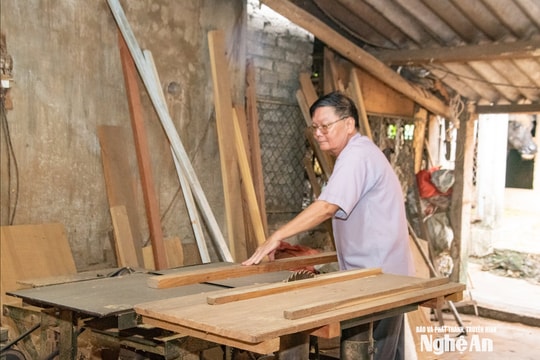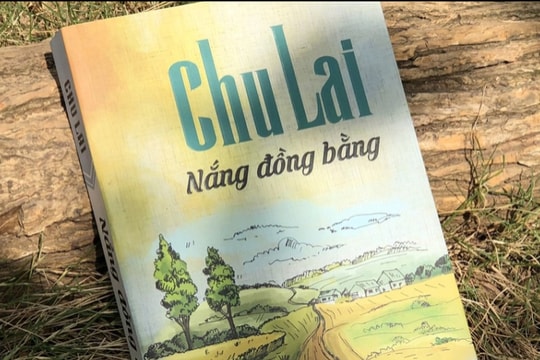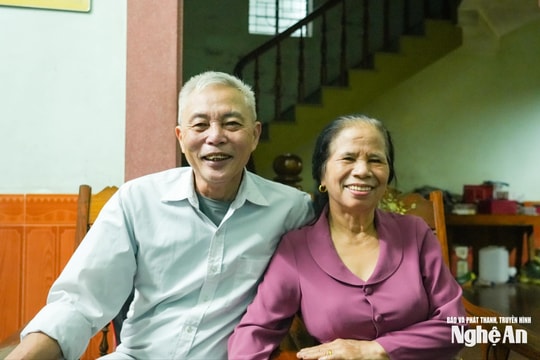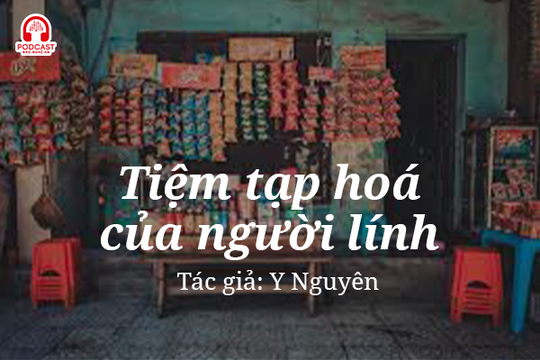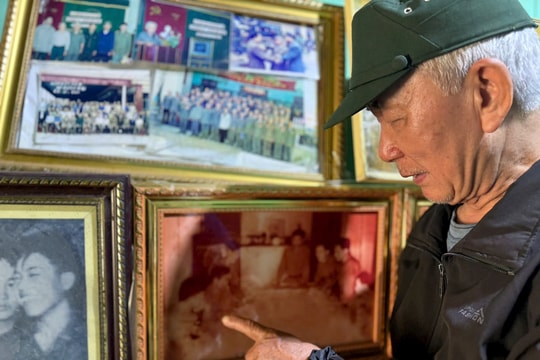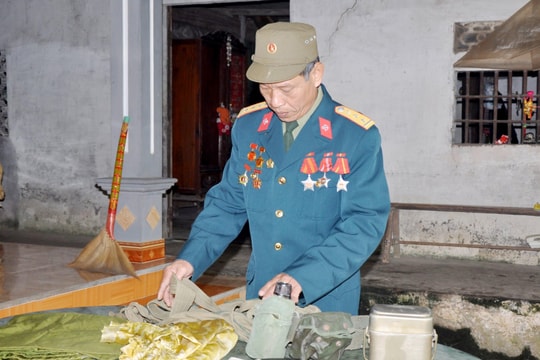Phan Thuy Ha: Blood and tears are not for gifts
(Baonghean) - Around December 22, “Don’t tell my name” by a girl from Nghe An - Phan Thuy Ha appeared as a “phenomenon”. The book is about the fate of soldiers who have experienced the brutal war and the pain and memories they keep that haunt them forever.
Don't call me a writer
Once, when interviewing Ha for an article, I called her a writer, she reacted strongly. “Don’t call me writer Phan Thuy Ha. I’m not a writer.” Although Ha has many works published in central newspapers, she is planning to publish a book about real people and real events in her hometown. Importantly, Ha’s writing has style – something that many writers today do not have.
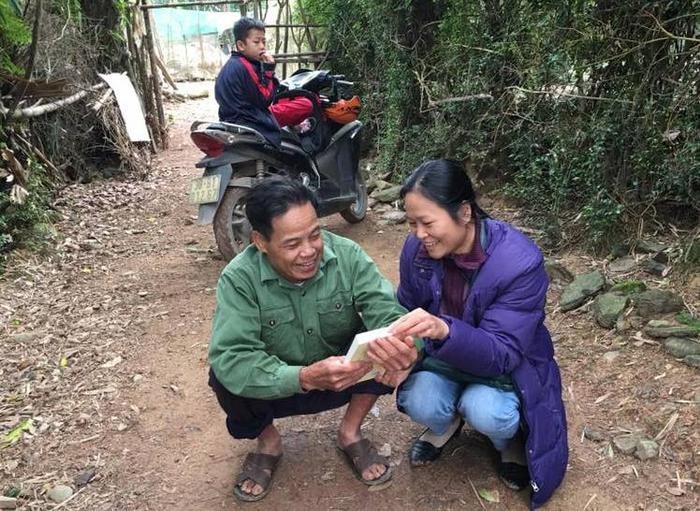 |
| Phan Thuy Ha gives books to characters. |
Phan Thuy Ha used to be a long-time editor of the Women's Publishing House. Suddenly, she quit her job to stay home to take care of her children and write and write for newspapers. During her children's summer days, she was determined not to let smartphones and extra-curricular programs "steal" her knowledge. The three of them traveled by train from the North to the Central, all the way to the South, and back to the Central Highlands, for months at a time. Traveling so that the mother could have more material for her writings, so that the children could learn communication and sharing skills... from real people, real events, real lives. Once, I joked with her, "My family is well-off." She laughed: "What are the conditions? I go to the homes of my fellow countrymen and acquaintances, listen to their stories, stay at their homes, send them money for meals... Determined to "go into the field" to have material for my writings."
Ha always considers herself to be just a listener and a rewriter of the story. The character herself is the storyteller. She shared that, at first, it was also difficult to ask, because she was not familiar with them, many of the villagers did not want to talk. But when one villager told the story, and when she got to know the whole village, one called the other to tell the story. After telling the story, she did not know when it would end, the memories continued, but after telling the story, she sometimes hesitated, "Don't tell my name." That is also the name of Ha's first book, which carries the general spirit of the book's content.
Ha herself is the daughter of a soldier, she sympathizes with the war stories from her father's story, the stories of her villagers. Just one commune in Ha's hometown has more than 100 martyrs, every family has children, younger siblings who are martyrs, and also has people who joined the army. The people Ha met are all valuable sources of information that she determined "I need to write, my children need to know". When the stories Ha wrote reached the hands of veterans, they said that their stories were even more haunting and were willing to share their feelings with her. I think that is the fate and talent of the author, when finding rare documents, when her characters wholeheartedly share.
Use money from home renovation to write a book
Ha said the journey to bring books to readers was not easy at first. She went to a bookstore and asked if she could send some books there. After a year, if they did not sell them, she would take them back. They asked what the topic was. After listening, she almost refused. No one knew the author's name. The topic was also boring.
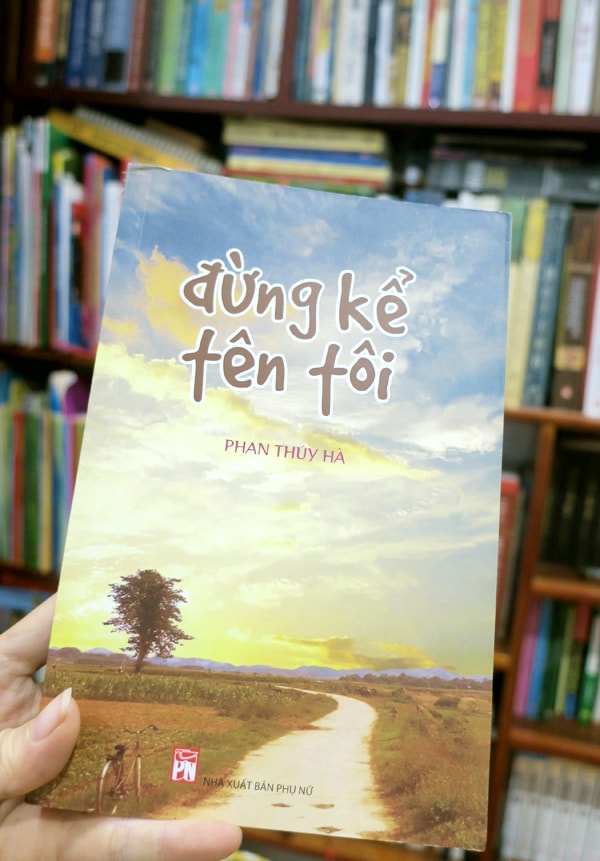 |
| The book "Don't tell my name" by Phan Thuy Ha. |
Before that, when Ha sent the manuscript to a bookstore. The answer made her tremble. "The writing style is poor, the quality is weak, not attractive, we cannot cooperate." Sitting blankly in front of the computer. Her husband said, "You're funny, why give it to them, leave it to me."
Ha said, I sat there not because I felt sorry for myself. But I felt sorry for myself. I understood why my uncles and aunts did not bother to tell their story. Blood and tears are not things to be used as gifts for stories.
The field trips of Ha and her mother were sponsored by her husband. Even the longest trip to meet dozens of characters in Ha's book "Don't mention my name" was funded by money from... home repair. Her husband gave her 100 million to repair the house, but she thought about it and realized that home repair was not as necessary as finding veterans. She was so concerned about the book that she had sleepless nights, worrying because: "The stories that are perhaps the best of the war, are not this victory or that victory, but the feelings of the people involved, the endless endurance and sacrifice of the unknown soldiers. If there is no more opportunity to tell, they will gradually pass away, all of them are over 70, 80 years old, there are wonderful stories that will follow them into the ground and remain silent forever."
Blood and Tears is not a story for gifts
Ha's works are completely non-fiction but are more attractive than many works full of imagination. Because, as poet Thuc Linh said: “Life is more terrible than anything imagined. In Ha's work, he writes about soldiers with impressive stories: The soldier carried on his back the rotting corpses of his comrades after a week of not being able to withdraw from the battlefield, the corpses were torn apart by flocks of birds, dragged through the bullets, sometimes with their heads and limbs separated, that soldier still had a disease on his skin, like a mental illness every time he remembered the flesh of his comrades melting on his body. The soldier told about how he hoped the enemy would attack because then he could find food in the enemy's military backpack, the discouragement, the plans to leave the front, the betrayals... right when the war was at its most ferocious. Those soldiers even had to struggle to regain their presence in that war, to be able to enjoy some "regime" or sometimes to clarify the truth about their fallen comrades”.
Ha shares about her characters: “Why do they keep such a fierce story to themselves?
Because they are men. Because they are soldiers. Or, because they are Vietnamese?
Because no one asked. Because we have shown ourselves unworthy to be heard?
- What was your dream at that time?
- My dream at that time was to go home to have a meal with my mother and sister and then return to the battlefield to die.
The characters in Ha’s books are completely real, with completely real stories that seem to have been forgotten by the dust of the past. But then, when told to Ha, and she tells them to the readers, those truths are expressed with all the heart and pain, coming back to haunt the readers.
Instead of choosing topics close to her generation so that it would be easy to print and sell books, Phan Thuy Ha chose to write about war and post-war when the war ended 4 years before she was born. Ha's book pages awakened readers' interest and humanistic values about soldiers. After reading her book, readers contributed 800,000 VND each month to donate to a character to share the burden of making a living. Some readers spent money to buy books and asked Ha to give them to any veteran she met...
And Ha, still simple and determined like the Nghe girl's nature, said she still has many stories to tell, besides this book.
| The way a young author, born 4 years after 1975, records, asks questions and rewrites the stories of the characters who went through the war, has something that reminds me of Svetlana Alexievich, Nobel Prize in Literature 2015, with "War without a woman's face". That is, not writing about war but about the people in war, not writing the history of war but the history of emotions. And emotions, has anyone asked the young men in their twenties who were eager to go to war to kill the enemy back then how they live and think in remote, poor villages? The post-war problem and psychological burdens are not the problem of any particular country, they are the problem of humanity -Facebook of journalist Ha Pham. “If the death certificate of her previous husband is lost, will my wife dare to leave to find her own life? She said she will wait. If the person has not returned and there is no death certificate, she will not leave. The death certificate was not about the seventeen year old girl who one day turned into an old woman. Death certificate not yet about seventeen year old girl living a quiet life with inferiority complex with illegitimate child. The death certificate has not arrived yet because it may be in the communal government's cabinet, eaten by termites and eaten away by cockroaches.(Excerpt from book) “A family of 8 people participated in the war. Two brothers were seriously poisoned. One brother was bedridden for 10 years and died. Another brother was like a dried corpse in bed for 15 years... Fighting is not a profession. There is no profession in fighting. Let me tell you, I didn't join the army but I joined the war just like a soldier on the front line. I work as a liaison for the commune officials, and you know my commune. When planes pass by, they drop bombs, and when they come back, they drop bombs. The bomb killed my girlfriend who was sitting on the toilet, she died in the toilet before she could pull her pants up. Over there, Mr. Tri's house was bombed, killing 6 children and 1 grandchild, making 7... from the war.(Book excerpt). |
Vo Huong
| RELATED NEWS |
|---|

